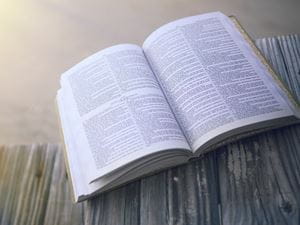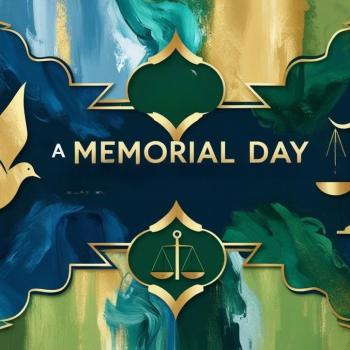
A great Christian writer takes the Catholic faith and reimagines it in ways that stir the reader’s imagination. It’s a rare talent, although this is exactly what Marilynne Robinson does in her gorgeous novels – especially her second most recent, Lila (2014). Even more than in Robinson’s other publications, you see, Lila charts an experience of ultimately generative struggle with a biblical text.
And while many verses appear in the novel, mostly drawn from Hebrew Scriptures, the text which intrigues Lila most is Ezekiel 1. Again and again, our title character finds herself drawn back to that intense imagery found in the prophet’s initial vision. To discern a passage’s meaning, then, the reader must wrestle with it over time.
And what a passage it is. In his preamble to the vision proper, Ezekiel makes an astonishing claim – even by prophetic standards! He professes, in verse 1, to have been gifted ‘visions of God.’ Not visions from God but visions of God. A tiny word with enormous implications. Easy to miss, all the same.
Even if Ezekiel didn’t see God face to face – because no man can see God and live, according to Exodus 33:20 – we can still rejoice that God chose to reveal something of His nature to the prophet. In this article on Ezekiel, Robinson’s take on chapter 1, as channeled through Lila, will interact with my reading of it.
It is in this reciprocal way that interpretation works. Bible study means conversation between believers as to what our sacred writings convey. The more participants the better, so get involved! Everyone starts as a newcomer to the Bible; and when Lila first approaches Ezekiel, her earliest impressions betray her naivety. This is one of the features, however, which makes the character endearing.
As Lila reads about ‘a fire infolding itself,’ borne on ‘a stormy wind,’ she surmises: ‘Well, that could have been a prairie fire in a drought year’ (68), as if Ezekiel were prophesying from the plains of America’s Midwest. It’s easy to read this as a joke at Lila’s expense, but every biblical scholar starts off as a newbie too.
That infolding fire, though. Such an enlightening image – in more ways than one! The fire is its own fuel, a self-renewing beacon which never goes out. Approaching this blaze with reverence, we come to the main protagonist of Ezekiel 1: the Holy Spirit. I cannot suggest a better aid elsewhere in the Bible for conceptualizing this Person of the Trinity than Ezekiel’s undying flames.
All the same, Ezekiel doesn’t really do simplicity. The message is encrypted into his clever imagery. Some theological digging is necessary… Lila gets as far as the description of God’s ‘living creatures,’ those curious composites more bizarre than anything from Doctor Who, then boggles at such eccentric entities. ‘Well, she didn’t know what to make of that.’ Understandable.
To me, the living creatures are part of a parable. We can glean something foundational to Christian theology from between the lines. Alternatively, the passage is like a physics demonstration, where instead of electromagnetism or Newton’s Laws, the spiritual essence of all existence is being exhibited: a metaphysics demonstration, if you will.
The message of Ezekiel’s parable is that age-old article in the Nicene Creed: the Holy Spirit as the Giver of Life; ‘whither the spirit was to go, they [the living creatures] went’ (v. 12). As a rule, Ezekiel is telling us, no life is possible outside the Holy Spirit. Ezekiel 1 feels very surreal to the reader because it explores this rarely pondered idea, the Spirit’s animating will.
Plato, to bring in some classical thought, regarded only things which could move themselves as being alive (Laws 895c), but it’s clear that only because of the Holy Spirit are Ezekiel’s creatures able to move at all. The Spirit is, by Plato’s definition, the sole Being who can truly be called alive. And on this basis, Christians can logically conclude, He is the source of all created life.
To return to Robinson, Lila does come into her own as a theologian eventually. She learns to relate Ezekiel to her own experiences. You see, Lila was freed from an abusive home as an infant. Our young protagonist was delivered from the chains of domestic suffering by Doll, a destitute yet resilient wanderer through the 1930s Midwestern Dustbowl.
So, Lila’s memory becomes her key to unlocking Ezekiel: ‘And when Doll took her up, and swept her away, she had felt a likeness of wings. She had thought, Strange as all this is, there might be something to it’ (68). In Lila’s past is an experience of merciful rescue. This reflects to her the character of God.
Robinson is wise enough, as well, to refuse Lila one sweeping moment of total revelation. That would be facile. Nobody picks up a Bible and understands it on the spot. Instead, this first encounter with Ezekiel proves to be the start of an ongoing relationship between the prophet’s account and Robinson’s heroine.
And as Lila sits with Ezekiel 1, she starts to perceive its ambiguities. Examining verse 10 – ‘As for the likeness of their faces…’ – Lila reasons: ‘If you think about a human face, it can be something you don’t want to look at, so sad or so hard or so kind.’ She continues, ‘It can be something you want to hide, because it pretty well shows where you’ve been and what you can expect’ (82).
These are keen observations. Okay, the creatures may well have a human face. That’s all well and good. What is more interesting is the kind of expressions they wear and what sort of story these emotional cues reveal. On a wider point, images are open-ended inasmuch as people can visualize them in different ways – just as Lila demonstrates.
And while Robinson’s budding theologian can be articulate, she can also be laconic. All Robinson has to tell us about Lila’s reaction to verse 13b – ‘The fire went up and down among the living creatures…’ – is: ‘It reminded her of the wildness of things’ (106). No nonsense with our Lila, direct and unpretentious. Plain as a toffee penny.
The light imagery which abounds in Ezekiel 1 ties the living creatures inextricably to the ‘fire infolding itself,’ or the Holy Spirit. It’s all very Pentecostal. Using such a visual clue, the prophet underlines the fact of all created life issuing from the Spirit, whose animating spark ignites every soul into being.
There is even a foreshadowing of Easter in Ezekiel 1. The creatures are lifted in verse 19, even as the Spirit raised our Lord from the dead (Romans 8:11). And as Paul the Apostle teaches in the same verse, this is the Gospel in brief; ‘If the same Holy Spirit lives in you, He will give life to your bodies in the same way.’
Lila’s interpretations of Ezekiel 1 are complex and varied. Sometimes the text inspires trepidation in her. On arriving at verse 25 – ‘And there was a voice above the firmament that was over their heads…’ – Lila draws back. ‘She didn’t want to know what the verse meant, what the creatures were.’
Why such apprehension? ‘She knew there were words so terrible you heard them with your whole body’ (110). But even so, Lila detects in the Bible a way of speaking about how things are that is without equal. ‘She had never heard anyone talk this way about existence, about the great storms that rise in it.’
A great storm is what Ezekiel so vividly portrays in verse 14: ‘And the living creatures ran and returned as the appearance of a flash of lightning.’ Once more, Lila returns to her more pithy form of analysis. Writes Robinson, ‘She [Lila, that is] never expected to find so many things she already knew about written down in a book.’
Of course, this is paradoxical because Lila has already spent a great amount of time in Ezekiel, contending with its concepts. How can she say that what she finds there she knows already? Perhaps this is a comment on our instinctive knowledge, at some level, of God. Only because the Holy One first knew us is any such intuition on our part a possibility.
Life itself is the first ever gift we receive. And the process by which we receive it is a paradigm of divine grace. None of us asked to be created. “Hey God, please create me!” said nobody ever.
The nature of God the Holy Spirit – so powerfully rendered in Ezekiel 1 – is to give life, and all that is life-renewing, before we can so much as our articulate our needs. ‘For our God is a consuming fire’ (Hebrews 12:29), the furnace in which existence itself is continually reforged.
4/29/2022 5:46:54 PM





